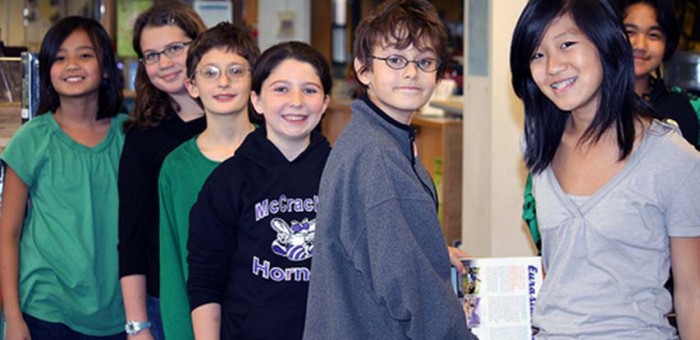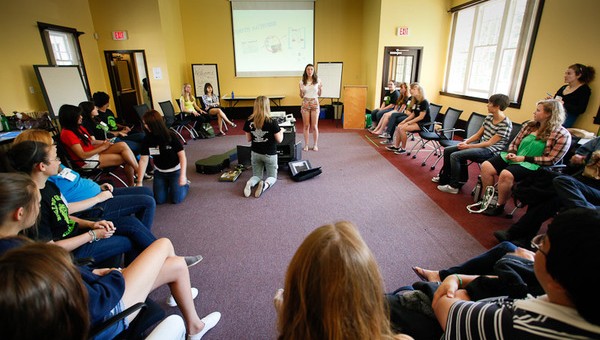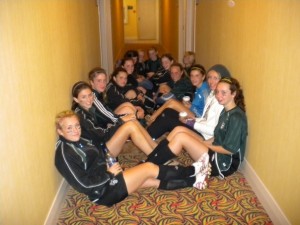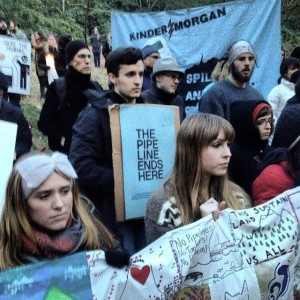Children and Family
Child and Youth Mental Health in British Columbia
This is the first in a seven week series that will examine the topic of child and youth mental health in B.C. As this is a complex and multifaceted topic, I will be narrowing my focus to a few popular beliefs and areas of concern that I have witnessed in my role as MLA. The purpose of this series is to debunk these beliefs, increase awareness of these concerns, end the stigma of mental health in our society and provide opportunities for you to impact what is happening in your community.
Over the last two years in my role as MLA it has become apparent that a central challenge we are facing, both locally and provincially, is that of addressing the mental health needs of youth. Through first hand experiences shared by constituents and the research conducted over a period of several months by my office I have begun to realize how limited the understanding of this issue is. Moreover, I have become concerned about the popular beliefs that underpin conversations and thinking about mental health.
Over the next several weeks I will be releasing a series of posts that will examine the topic of adolescent mental health in our region. My goal with this series is to debunk these dominant beliefs, increase awareness of these areas of concerns, and decrease the stigma of mental health in our society. We will also offer action items that you as individuals can undertake to impact what is happening in your community.
Popular Belief One: Mental Health is not a mainstream issue
Reality: Mental health is as mainstream as any health or social issue in our society today – perhaps more so. It is so mainstream, that you would be hard-pressed to find any individual that has not been impacted by mental health challenges in some way, whether it be directly or indirectly.
According to the Mental Health Commission of Canada (MHCC), by the time people reach 40 years of age, 50% of people in Canada will have had or have a mental illness. But it is not just the people who experience mental health problems that are impacted by them. When we include families and caregivers, mental health problems will impact almost every Canadian at some point throughout their lifetime.
However, challenges related to Mental Health not only put an immeasurable burden on the individuals and families facing them head-on, they also place a heavy weight on society. One study found that in Ontario, the burden of mental illness and addiction is one and a half times higher than all cancers put together and more than seven times that of all infectious diseases.
Similarly, when taking into account health care costs, lost productivity and reductions in health-related quality of life, the economic cost alone of mental health challenges is estimated to be $51 billion per year in Canada.
Popular Belief Two: Mental Health is not a youth issue
Reality: Surpassed only by injuries, mental health challenges in youth are ranked as the second highest hospital care expenditure in Canada.
Today, more than 6.7 million Canadians (1 in 5) are living with a mental health challenge. 75% of these mental health problems occur before the age of 25, while 50% develop by age 14. In fact, young people aged 15 to 24 are more likely to experience mental illness than any other age group.
It is estimated that 10-20% of Canadian youth are affected by a mental illness or disorder. While at the same time, at least 3.2 million youth between the ages of 12 to 19 are at risk for developing a mental health challenge.
Here in British Columbia the numbers are not any better. According to the Ministry of Children and Family Development, approximately 15% of children and youth (140,000) in B.C. experience some sort of mental health problem. And just as troubling, it is estimated that less than 30% of youth who need mental health services ever access them, significantly increasing the chances that these challenges will carry-on into adulthood.
Understanding the true prevalence and scope of mental health challenges is the first step to reassessing how we as a society approach the topic of mental health as a whole. With an underfunded system focused primarily on the treatment of disease, we find ourselves fighting against mental illness instead of striving for mental well-being.
Weekly Action Item
This week’s action item is simple, yet it is perhaps the most important thing you can do to support the mental health and well-being of yourself and others – Get Informed.
Educate yourself about what mental health, and mental ill-health, really mean: What is mental health? How can we promote and achieve mental well-being? What is mental illness? What are signs and symptoms of mental illness? How can mental health challenges materialize in day-to-day life? How can you support someone struggling with mental health challenges? These are just a few of the questions that I hope you will all seek to understand over the next week.
To assist you in this endeavor you can find a wealth of resources online. Below I have provided links to just a few of them:
Asking the Select Standing Committee on Health to Examine MSP Premiums
In January of this year I wrote about the importance of transforming our regressive approach to funding health care via flat-rate MSP premiums to a more progressive approach like that in place in Ontario. A month later I tabled a petition in the legislature of 6,662 British Columbians who agreed and then, during question period, I asked the Minister of Finance if the government would empower the Select Standing Committee on Health to examine innovative, progressive ways of revising how MSP premiums are charged in British Columbia. In his response, the Minister noted that he believed that the mandate of the committee was sufficiently broad for “members of the committee, and those that they might invite in, to have the kind of conversation that the member is alluding to”. He further offered “and it will be interesting to see what results from that conversation.”
On April 13th I followed up by formally writing to the Chair of the Select Standing Committee and asking two specific questions regarding the possibility of initiating a conversation with respect to the funding of MSP in British Columbia. Below is the text of my letter. I await a response.
Letter to the Select Standing Committee on Health
April 13th, 2015
Mrs. Linda Larson, MLA and Chair
Select Standing Committee on Health
Room 224, Parliament Buildings
Victoria, British Columbia
V8V 1X4
Dear Mrs. Larson,
I am writing to you with respect to the question that I raised during question period earlier this session concerning Medical Services Plan (MSP) premiums. Minister de Jong’s response suggested that this Select Standing Committee on Health’s mandate could include a discussion regarding how MSP Premiums are collected.
Every month single British Columbians earning over $30,000 pay $72 in MSP premiums. This health insurance plan plays an important role, providing funding for medically required services, however in the last fifteen years fees have doubled. Furthermore the cost remains the same whether someone makes $30,000 or $300,000 a year. British Columbia’s regressive approach to collecting MSP Premiums unfairly burdens those least able to bear it and increases pressure on small business owners.
I believe that it’s time for B.C. to replace MSP premiums with a more progressive and equitable approach to funding our health care system. Overhauling our current, regressive approach would be a positive step in addressing poverty and income inequality, and ensuring a sustainable health care system for now, and future generations.
With this in mind I stood in the house and asked the Finance Minister to expand the Select Standing Committee on Health’s terms of reference to allow for the committee to examine more progressive and more innovative ways of charging MSP Premiums. He responded,
“I think the power exists now. I think the committee, charged as it is to ‘examine the projected impact on the provincial health care system of demographic trends to the year 2036 on a sustainable health care system for British Columbians’ […] I think that’s probably sufficiently broad for members of the committee, and those that they might invite in, to have the kind of conversation that the member is alluding to, and it will be interesting to see what results from that conversation.”
He pointed to two specific sections of the terms of reference. The committee has been empowered to:
Outline potential alternative strategies to mitigate the impact of the significant cost drivers identified in the Report on the sustainability and improvement of the provincial health care system;
Consider health capital funding options.
I recognize that the committee has already begun reviewing submissions regarding rural health, addiction recovery, integrated teams and end of life care. I also recognize that the committee has decided to first look at the submissions it has received, in fairness to those who have given them. Going forward I have the following questions for the committee:
- The Select Standing Committee on Health has been given the task of examining the projected impact on the provincial health care system of demographic trends on a sustainable health care system for British Columbians. Their terms of reference came from the Finance Minister who has stated that, in his opinion, they are sufficiently broad for members of the discuss MSP Premiums. This regressive tax generates 2.3 billion dollars in government revenue, comparable to corporate income taxes. This tax can be charged in a more equitable fashion. I believe this is a conversation that British Columbians deserve and that this committee is an appropriate venue. Will the Select Standing Committee on Health agree to include MSP Premiums as part of their next discussion and call for submissions?
- When first given this new mandate the committee was given the option to consider both the original and the new mandates, concurrently. This option is still available. The committee can begin discussing their new terms of reference without taking away from the submissions review. This would allow for more clarity and could allow the committee to begin a new call for submissions while still reviewing those they have already received. I recognize that proper deliberation requires time and should not be rushed. With this in mind would the committee be open to discussing their expanded terms of reference at the same time as they review their current submissions?
I look forward to the committee’s response and thank the members for their time.
Sincerely,
Andrew Weaver
MLA Oak Bay-Gordon Head
Cc: Judy Darcy, Deputy Chair
Celebrating youth in our community – Lizzie Bomford
This is the seventeenth in our series of stories celebrating the outstanding accomplishments of youth in our community. These inspirational young adults are enriching our lives with their passion and commitment to the betterment of society.
Lizzie Bomford
 I first met Lizzie briefly at the Democracy in Action Youth Conference in Victoria on October 28, 2014. Within minutes of chatting with her I recognized that she was an incredibly talented, articulate and motivated young woman. She immediately struck me as just the type of inspirational young person that Judy Fainstein and I try to feature in our Celebrating Youth in our Community series. On November 21, just a few weeks later we arranged to interview Lizzie at my constituency office. To say we were impressed with Lizzie’s passion for politics and democracy, as well as her long list of accomplishments, would be an understatement.
I first met Lizzie briefly at the Democracy in Action Youth Conference in Victoria on October 28, 2014. Within minutes of chatting with her I recognized that she was an incredibly talented, articulate and motivated young woman. She immediately struck me as just the type of inspirational young person that Judy Fainstein and I try to feature in our Celebrating Youth in our Community series. On November 21, just a few weeks later we arranged to interview Lizzie at my constituency office. To say we were impressed with Lizzie’s passion for politics and democracy, as well as her long list of accomplishments, would be an understatement.
Lizzie was nominated by Mount Doug’s principal and subsequently selected as one of only thirty BC youth leaders to attend the Democracy in Action Conference sponsored by the Rotary Club. It was a pilot initiative of the BC Ministry of Community, Sport and Cultural Development, where youth were provided with an opportunity to meet government leaders, learn about the electoral process and the operations of government. Vicki Huntington the Independent MLA from Delta South and I were honoured to speak with the thirty leaders of tomorrow and were profoundly impressed by the engaging discussions that ensued.
Lizzie was born in Victoria and moved to Port Alberni at age three. There she attended Wood Elementary School, followed by École E. J. Dunn Middle School where she was schooled in French Immersion from Grades 6 to 8. In March 2011, Lizzie applied to the Mt. Doug Challenge Program for Gifted and Talented Students. The application process included a three-hour exam. Lizzie had done her research and determined that Mt. Doug’s Challenge Program was the best fit for her. Needless to say she was accepted. At the age of just fourteen, she packed her bags and moved to Victoria to live with a family member so that she could start the challenge program in grade nine. Lizzie has thrived at Mt. Doug and has immersed herself into so many aspects of her high school, that it would be hard to cover all her activities – and there are so many.
 Lizzie has maintained a high academic standing throughout high school. Her academic load in Grade 12 includes Advanced Placement Physics, Pre-Calculus and Calculus, Chemistry and English Challenge. In addition to academic excellence, Lizzie has taken on many leadership roles in the school. She currently serves at Prime Minister in the school’s Student Council (one of three “Tri-Ministers”), which is modeled on the Provincial Legislature. Lizzie is a natural born leader with a talent for pubic speaking. This is her third year on Student Council. In Grade 11, she was Co-Minister of Environment and in Grade 10 she was Junior Minister of Environment.
Lizzie has maintained a high academic standing throughout high school. Her academic load in Grade 12 includes Advanced Placement Physics, Pre-Calculus and Calculus, Chemistry and English Challenge. In addition to academic excellence, Lizzie has taken on many leadership roles in the school. She currently serves at Prime Minister in the school’s Student Council (one of three “Tri-Ministers”), which is modeled on the Provincial Legislature. Lizzie is a natural born leader with a talent for pubic speaking. This is her third year on Student Council. In Grade 11, she was Co-Minister of Environment and in Grade 10 she was Junior Minister of Environment.
Lizzie was a founding member of the Mt. Doug Model United Nations Club. She is very interested in international politics and works hard to hone her public speaking and debating skills. At a Model Commonwealth Conference at St. Michaels University School in October 2014, Lizzie represented New Zealand.
Lizzie’s other school club involvement includes the Youth Combating Intolerance Club and she was a founding member of the Mt. Doug Club Council, which was started in September 2014. When asked what makes her upset, Lizzie immediately, and without hesitation responded “Bill 2“. She informed us about her recent visit to the legislature and watching Question Period and the debate on Bill 2 — Greenhouse Gas Industrial Reporting and Control Act. There she recalled feeling outraged at the government’s singular focus on LNG and their dismantling of greenhouse gas emissions control legislation. She described a passionate exchange between two students who were wondering “is there anything we could do?” On the lighter side, when asked what makes her happy, Lizzie offered “waking up early at 5am to watch Disney Movies” and, oddly, Broccoli!
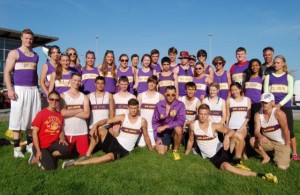 Athletic endeavors are a big part of Lizzie’s school life and she has joined several school teams at Mt. Doug. She was on school volleyball and curling teams in Grade 9. Since Grade 10, Lizzie has been a member of the Cheerleading Team and this year she is the Team Captain. When she joined cheerleading, she did so because “my friends bet me I couldn’t, so I decided to prove them wrong”. Although she told us “everything I do starts as a joke”, it is clear that Lizzie puts heart and soul into her athletic endeavors and her hard work pays off. After only 2 months on the cheerleading team, Lizzie broke two ribs during practice, but she persevered and her dedication has led to her becoming team captain. She loves the team bonding and appreciates that she has learned so much from the experience. She loves to see her teammates and especially the younger cheerleaders improve, recognizing that the “team is more important than me”.
Athletic endeavors are a big part of Lizzie’s school life and she has joined several school teams at Mt. Doug. She was on school volleyball and curling teams in Grade 9. Since Grade 10, Lizzie has been a member of the Cheerleading Team and this year she is the Team Captain. When she joined cheerleading, she did so because “my friends bet me I couldn’t, so I decided to prove them wrong”. Although she told us “everything I do starts as a joke”, it is clear that Lizzie puts heart and soul into her athletic endeavors and her hard work pays off. After only 2 months on the cheerleading team, Lizzie broke two ribs during practice, but she persevered and her dedication has led to her becoming team captain. She loves the team bonding and appreciates that she has learned so much from the experience. She loves to see her teammates and especially the younger cheerleaders improve, recognizing that the “team is more important than me”.
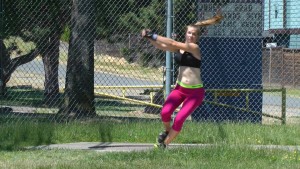 With the same enthusiasm and dedication, Lizzie has been a member of Mt. Doug’s Track and Field Team since April 2013. “I took to the hammer throw event immediately” upon giving it a try, after joining the track team “so I could do stuff with my friends”. She has become a formidable competitor in hammer throw, discus and shot put, placing very well in BC High School Track and Field Championships. Her best result in the provincial meet was 3rd place in hammer throw in 2014 (with an impressive distance of 48 meters, 26 centimeters). Within 16 months of taking up the hammer throw, Lizzie placed 5th nationally in her age category. To achieve this success, Lizzie spent 8 hours per week at practicing and 4 hours per week in weight training.
With the same enthusiasm and dedication, Lizzie has been a member of Mt. Doug’s Track and Field Team since April 2013. “I took to the hammer throw event immediately” upon giving it a try, after joining the track team “so I could do stuff with my friends”. She has become a formidable competitor in hammer throw, discus and shot put, placing very well in BC High School Track and Field Championships. Her best result in the provincial meet was 3rd place in hammer throw in 2014 (with an impressive distance of 48 meters, 26 centimeters). Within 16 months of taking up the hammer throw, Lizzie placed 5th nationally in her age category. To achieve this success, Lizzie spent 8 hours per week at practicing and 4 hours per week in weight training.
Not surprisingly, with her enthusiasm and outgoing nature, Lizzie loves volunteering as the school mascot — the Mount Doug Ram — which she has done since arriving at Mt. Doug in 2011.
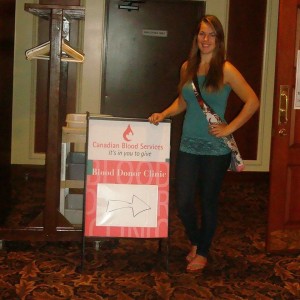 After hearing a presentation about Our Place Society in 2012, Lizzie decided to become a volunteer there. Through this experience, she has had her eyes opened up to the societal impact of poverty and homelessness. “I could have said no, this is too hard for me to do, but I didn’t, I went back” and this volunteering has become an important part of her life.
After hearing a presentation about Our Place Society in 2012, Lizzie decided to become a volunteer there. Through this experience, she has had her eyes opened up to the societal impact of poverty and homelessness. “I could have said no, this is too hard for me to do, but I didn’t, I went back” and this volunteering has become an important part of her life.
In terms of career plans, Lizzie has a very clear vision of where she is headed in the future. In her own words:
“In the near future I would like to pursue post secondary education, studying either physics or mathematics as well as political sciences. Afterwards, I would like to begin a career in politics, starting first as an intern at the BC Legislature. Later I would like to begin running as an independent. If I should get into office I would like to push for increased funding to low cost housing, better work placement programs and better rehabilitation and drug prevention programs. To do this I believe education is the place to begin.”
Lizzie has tremendous drive, passion and is highly motivated to succeed. She is a powerful and articulate communicator who is not afraid of stepping up into a leadership role. For example, when she wanted to learn more about politics and the workings of the Legislature, she organized a field trip for the Mt. Doug Leadership class. She followed up by inviting me to participate in a broader discussion with the many leadership students at Mount Doug who were unable to participate in the tour.
Lizzie is destined for greatness. She is a leader with a vision. A vision that so many find easy to rally behind. Thank you Lizzie for inspiring those around you.
|
Match: dash and others.
<scr” +=”” “ipt=””> dash1 (dăsh)
 v., dashed, dash·ing, dash·es.v.tr. v., dashed, dash·ing, dash·es.v.tr.
v.intr.
n.
[Middle English dashen, probably of Scandinavian origin, akin to Danish daske, to beat.]
[Alteration of DAMN.] Copyright © 2014 Answers Corporation. All rights reserved. |
Celebrating youth in our community – Robert MacDonald
This is the sixteenth in our series of stories celebrating the outstanding accomplishments of youth in our community. These inspirational young adults are enriching our lives with their passion and commitment to the betterment of society.
Robert MacDonald
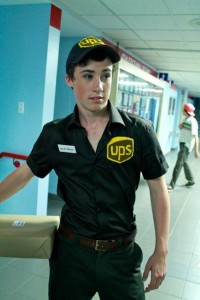 During the 2012/2013 academic year, Claremont High School established an innovative new educational program through its Institute for Global Solutions. As noted on the Saanich School District (SD63) website, the Institute provides a “project-based curriculum [that is] designed to equip students with tools and experiences to address the unprecedented environmental and humanitarian challenges of the 21st century –from poverty reduction to climate change and urbanization to sustainable energy.” Now in its 3rd year, the Institute for Global Solutions draws students from across the Capital Regional District to Claremont. Robert MacDonald is one of those students.
During the 2012/2013 academic year, Claremont High School established an innovative new educational program through its Institute for Global Solutions. As noted on the Saanich School District (SD63) website, the Institute provides a “project-based curriculum [that is] designed to equip students with tools and experiences to address the unprecedented environmental and humanitarian challenges of the 21st century –from poverty reduction to climate change and urbanization to sustainable energy.” Now in its 3rd year, the Institute for Global Solutions draws students from across the Capital Regional District to Claremont. Robert MacDonald is one of those students.
In October of last year, I gave a presentation to one of the Global Studies classes at Claremont. As I was leaving the class I bumped into Robert, a confident and articulate young man who teacher Mark Neufeld remarked, “you have got to meet”. Mark proceeded to describe how Robert was recently elected president of the Claremont student council but subsequently declined citing another candidate as a better choice. Needless to say, my curiosity was piqued. And so, Judy Fainstein and I decided to interview Robert to learn more about this remarkable young man.
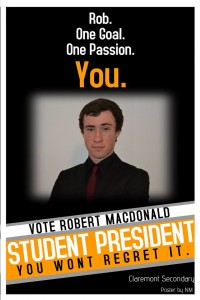 Now in his Grade 12 year, Robert grew up in Victoria and attended Cordova Bay Elementary and Royal Oak Middle School. In addition to excelling academically, Robert is involved in a diverse array of other activities including, but not limited to, musical theatre, the Pursuit of Excellence Program (which he terms “the club for keeners” and is linked to the Duke of Edinburgh award program) and student government.
Now in his Grade 12 year, Robert grew up in Victoria and attended Cordova Bay Elementary and Royal Oak Middle School. In addition to excelling academically, Robert is involved in a diverse array of other activities including, but not limited to, musical theatre, the Pursuit of Excellence Program (which he terms “the club for keeners” and is linked to the Duke of Edinburgh award program) and student government.
As alluded to above, Robert had a fascinating foray into student government. He joined three other students in seeking the presidency of school council as he believed that “there were a number of issues at school [that] were not being addressed.” One was the lack of change room space for the Claremont Sports Institute of Excellence and their highly regarded lacrosse program. Another involved his concern over declining school spirit; one of his ideas was to revamp the school house system.
During their election campaign, candidates were required to make separate speeches to students in each of grades nine through twelve. Robert recognized that in order to win, he needed to offer a unique speech — one that differentiated himself from his competitors — that was catered to each grade. He chose to use humour in his delivery, admitting that some of his jokes stirred up a fair amount of controversy. After his second speech, Robert had what he described as a “crisis of conscience”. He realized that he’d crafted his speeches with what he thought students wanted to hear, not what he wanted to say. After some reflection, he took a different approach in his speeches to the Grades 11 and 12 classes. This time he focused on praising the positions and views of all candidates and went so far as to suggest that students explore their merits as well prior to voting. But in the end, Robert won the election because of his exceptionally strong performance in the Grades 9 and 10 polls. Robert felt that he had won for all the wrong reasons and that the student in second place “deserved it more than me”. He worked hard to eventually convince her to accept the role and Robert is now content serving as her Vice President.
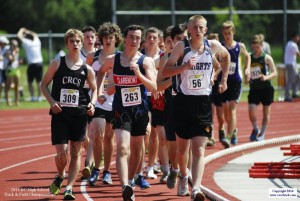 Claremont’s Institute for Global Solutions is a perfect fit for Robert. He’s described by Mark Neufeld, a founding teacher of the program, as a “very clever student that challenges himself and his teachers. He questions the world around him and seeks solutions. He has great potential to be a major contributor to our transition to a clean energy future”. Robert says he is inspired by Mr. Neufeld and adds, “I think like him and see the need for big changes in this world”.
Claremont’s Institute for Global Solutions is a perfect fit for Robert. He’s described by Mark Neufeld, a founding teacher of the program, as a “very clever student that challenges himself and his teachers. He questions the world around him and seeks solutions. He has great potential to be a major contributor to our transition to a clean energy future”. Robert says he is inspired by Mr. Neufeld and adds, “I think like him and see the need for big changes in this world”.
Robert loves acting and musical theatre and has performed in school productions of Legally Blond, 42nd Street and most recently as 2nd male lead in Grease playing “Kenickie”, where he had a solo performance of the song “Greased Lightning”. He’s also extremely active in sports, including snowboarding, cross country, race walking (finishing 10th in the Provincial Championships last year) and this year he has started curling on the school team. He describes himself as very social in nature and enjoys spending time with friends.
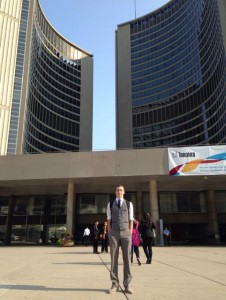 Ever since he was young, Robert’s family has acted as a host for a diversity of international students. These incredibly positive experiences inspired him to become involved in the school’s International Student Peer Advisors Club; last year he was its president. Club members assist international students academically and coordinate events and gatherings to help them fully integrate into the school community, tasks that Robert finds particularly rewarding.
Ever since he was young, Robert’s family has acted as a host for a diversity of international students. These incredibly positive experiences inspired him to become involved in the school’s International Student Peer Advisors Club; last year he was its president. Club members assist international students academically and coordinate events and gatherings to help them fully integrate into the school community, tasks that Robert finds particularly rewarding.
Outside of school, Robert belongs to the Vancouver Island Pointing Dog Club. His family raises Brittany Spaniels and he enjoys the occasional outing to go bird hunting. He lists his hobbies as running, snowboarding and ice skating (his father used to perform in the Ice Capades and is still active in the local skating community). Robert somehow manages to also hold down a part time job as a Sales Associate at Peppers Grocery.
Robert has his sights set on becoming a politician sometime in the future because “I want to change the system”. And Robert has a plan to get there. To commence he will obtain an undergraduate degree in political science and economics. Then he will study for a degree in law so that he can start his own corporate law practice “with a cool lobby”. He has already identified intellectual property law as a primary area of interest. He wants to start off in Toronto, work on Bay Street, subsequently practice in New York and earn a good salary. Yet Robert wants to eventually return to Victoria. He is a man with a plan. When asked why he wants to become a lawyer Robert immediately quipped “I gotta get into law school as I want five kids”.
 During the summer of 2014, Robert attended a 3-week youth summer program at the University of Toronto, where he learned about corporate law, civil litigation and criminal law. He really enjoyed staying in student residence at university and having the opportunity to visit the Ontario Provincial Court. He told us “Toronto opened my eyes to possibilities for the future”.
During the summer of 2014, Robert attended a 3-week youth summer program at the University of Toronto, where he learned about corporate law, civil litigation and criminal law. He really enjoyed staying in student residence at university and having the opportunity to visit the Ontario Provincial Court. He told us “Toronto opened my eyes to possibilities for the future”.
In his somewhat casual manner and with his self-deprecating, yet infectious, sense of humour, Robert told us confidently that his life goal was to “make the news” and “take the panhandle back for BC”. Not sure what he meant by the latter, Robert explained that the Alaskan Panhandle was historically part of Canada (and has been the subject of dispute since 1821).
Robert impressed us as an honest, forthright and ambitious young man. He says his friends would describe him as eccentric and non-conformist. But we would describe him as passionate, innovative, creative and a future leader — someone with a sense of direction and purpose. We’re confident that Robert will continue to challenge societal norms and endeavour to break down barriers to change. He’ll make an outstanding ambassador for Claremont’s Institute for Global Solutions and mark our words, we’ll be reading about him on the front page of the Globe and Mail in the not too distant future.
Celebrating youth in our community – Liticia Gardner
This is the fifteenth in our series of stories celebrating the outstanding accomplishments of youth in our community. These inspirational young adults are enriching our lives with their passion and commitment to the betterment of society.
Liticia Gardner
 This past November hardly a day went by without the protest against Trans Mountain drilling on Burnaby Mountain making the news headlines. While many of us sat at home wondering what we could do to show our support for the Burnaby protestors, Liticia was on the front lines. Just two months earlier, upon listening to a passionate, inspirational and motivating speech on Burnaby Mountain, given by Mayor Derek Corrigan, Liticia realized that she could no longer stand by and watch from the sidelines. She had to become involved in local efforts to stop the expansion of the Trans Mountain pipeline. And so Liticia joined the SFU Activist Network on Facebook and began volunteering her time sitting vigil at the blockade that had recently been set up.
This past November hardly a day went by without the protest against Trans Mountain drilling on Burnaby Mountain making the news headlines. While many of us sat at home wondering what we could do to show our support for the Burnaby protestors, Liticia was on the front lines. Just two months earlier, upon listening to a passionate, inspirational and motivating speech on Burnaby Mountain, given by Mayor Derek Corrigan, Liticia realized that she could no longer stand by and watch from the sidelines. She had to become involved in local efforts to stop the expansion of the Trans Mountain pipeline. And so Liticia joined the SFU Activist Network on Facebook and began volunteering her time sitting vigil at the blockade that had recently been set up.
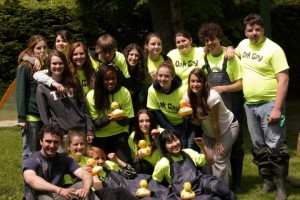 Liticia was born in Kamloops, BC and moved to Victoria when she was eight. She attended James Bay Elementary, Central Middle School, Oak Bay High School and graduated from Reynolds Secondary where she was awarded “Top Psychology Student” in 2012. Like so many of the inspirational youth we have been featuring over the past year, Liticia was extremely active in extracurricular activities during her high school years. For example, while in Grade 12, Liticia started the Best Buddies program at Reynolds, after volunteering as a Best Buddy at Oak Bay High from 2010 to 2012.
Liticia was born in Kamloops, BC and moved to Victoria when she was eight. She attended James Bay Elementary, Central Middle School, Oak Bay High School and graduated from Reynolds Secondary where she was awarded “Top Psychology Student” in 2012. Like so many of the inspirational youth we have been featuring over the past year, Liticia was extremely active in extracurricular activities during her high school years. For example, while in Grade 12, Liticia started the Best Buddies program at Reynolds, after volunteering as a Best Buddy at Oak Bay High from 2010 to 2012.
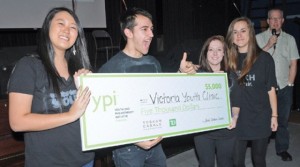 Some of her other activities at Oak Bay High included organizing a school wide composting program and helping to organize the annual Rubber Ducky Race in Bowker Creek with the schools’ Environment Club. In 2011, Liticia competed in the Youth Philanthropy Initiative and was part of a group of students that achieved a $5,000 grant for the Victoria Youth Clinic, a not-for-profit primary heath care service for youth aged 12 to 24 years.
Some of her other activities at Oak Bay High included organizing a school wide composting program and helping to organize the annual Rubber Ducky Race in Bowker Creek with the schools’ Environment Club. In 2011, Liticia competed in the Youth Philanthropy Initiative and was part of a group of students that achieved a $5,000 grant for the Victoria Youth Clinic, a not-for-profit primary heath care service for youth aged 12 to 24 years.
Liticia is also accomplished in soccer, which she started playing when she was 5 years old. She continues to play in intramural leagues at Simon Fraser University (SFU), where she began university this past September, having previously played competitively on the Bays United Gold Under 18 girls team and with the Lakehill Division 1 Women’s team.
In addition to soccer, Liticia is an avid scuba diver. In April 2013, she was certified with the Open Water certificate in Playa Del Carmen, Mexico while on a trip visiting Mexico, Belize and Guatemala. She immediately fell in love with diving and subsequently participated in ten dives while in Mexico, including two dives in underwater caverns (termed cenotes). Liticia was in awe with the diversity and beauty of the ocean life she witnessed during her numerous reef dives. She plans to undertake her first cold-water dive in Victoria some time this winter.
Following high school, Liticia attended Camosun College for two years. There she took university transfer courses and achieved the Dean’s List status in Winter 2013 with an A+ average. Not surprisingly, Liticia was awarded a Ken Caple College Transfer Entrance Scholarship to SFU where she is currently majoring in Gender, Sexuality and Women’s Studies, with a minor in Geography.
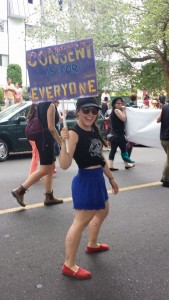 In her heart, Liticia is an activist and an advocate for a number of important social justice and environmental issues, viewing them through a lens of anti-oppression. When asked what caring about social justice meant to her, she immediately responded, “fighting for more equity as opposed to simply fighting for equality”. Liticia is outgoing and passionate and is committed to raising broader public awareness of the fact that some people inherently do not have the same access to much of what many of us take for granted. And she is not afraid to take direct action when she believes advocacy is needed.
In her heart, Liticia is an activist and an advocate for a number of important social justice and environmental issues, viewing them through a lens of anti-oppression. When asked what caring about social justice meant to her, she immediately responded, “fighting for more equity as opposed to simply fighting for equality”. Liticia is outgoing and passionate and is committed to raising broader public awareness of the fact that some people inherently do not have the same access to much of what many of us take for granted. And she is not afraid to take direct action when she believes advocacy is needed.
While at Camosun, Liticia was a member of the Psychology Club and the Women’s Centre. As a member of the University of Victoria Anti-Violence Project, she participated in 40 hours of training on sexualized violence and how to support both targets and perpetrators of violence. Currently working as a volunteer with SFU’s Women’s Centre, Liticia has been involved in the creation of “Safe(r) Places” at the university, where people can come to a safe space to openly discuss issues. She also initiated and runs a “radical mental health group” through Simon Fraser Public Interest Research Group (SFPIRG), hosting bi-weekly meetings on topics around mental health and well being.
Liticia likes to “think outside of the normal”. She cares deeply about issues related to equity, oppression and mental health. Inspired by poet Maya Angelou, whom she describes as “the most eloquent person I have ever heard”, Liticia urged us to listen to Maya recite her poem And Still I Rise. We did and we too were inspired.
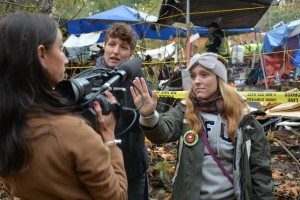 Liticia was profoundly affected by the demonstrations on Burnaby Mountain. It was a daily ritual for her to spend time at the blockade, not only reading and doing homework, but also supporting other activists by providing tea, food and access to showers. She told us that “every day was really different” on the mountain; some days were “really empowering” while others were “somber” or “depressing”. She described time when there was a general mood of hopelessness when people “felt the only thing you could do was cross the line”. Liticia was so committed to the blockade that when she learned via text that Kinder Morgan was on site and starting to drill, she “ran all the way across campus and down a muddy path” to immediately take her place at the blockade. Liticia was frequently pictured in media reports standing on the front lines of the blockade. While she saw many of her friends get arrested, she herself did not cross the police line.
Liticia was profoundly affected by the demonstrations on Burnaby Mountain. It was a daily ritual for her to spend time at the blockade, not only reading and doing homework, but also supporting other activists by providing tea, food and access to showers. She told us that “every day was really different” on the mountain; some days were “really empowering” while others were “somber” or “depressing”. She described time when there was a general mood of hopelessness when people “felt the only thing you could do was cross the line”. Liticia was so committed to the blockade that when she learned via text that Kinder Morgan was on site and starting to drill, she “ran all the way across campus and down a muddy path” to immediately take her place at the blockade. Liticia was frequently pictured in media reports standing on the front lines of the blockade. While she saw many of her friends get arrested, she herself did not cross the police line.
Liticia credits her mother with teaching her about “resiliency, hard work and perseverance”. She describes her mother as the “epitome of resiliency”. Liticia was born when her mother Alyshia was only 17 and “we went through a lot together”. Alyshia returned to school after Liticia was born, earning a nursing degree with distinction. For the past year, Liticia has helped her mother with her business Nurse Next Door, handling Human Resources for the business. We quickly recognized that Alyshia has clearly been the most influential person in Liticia’s life. But Liticia also credits Lucas Crawford, a professor in Gender Studies at SFU, as “one of the people who have put a lot of time into me”.
Committing herself to environmental issues will be a life-long pursuit for Liticia. Of this she is certain. Liticia noted that the environment is where Indigenous issues, women’s issues, as well as issues of social class and social justice all come together. Her long-term goal is to become a university professor, undertaking teaching and research in Gender Studies. And when she undoubtedly accomplishes this goal, she’ll inspire a new generation of youth to work towards the betterment of society. Of this, we are certain.

